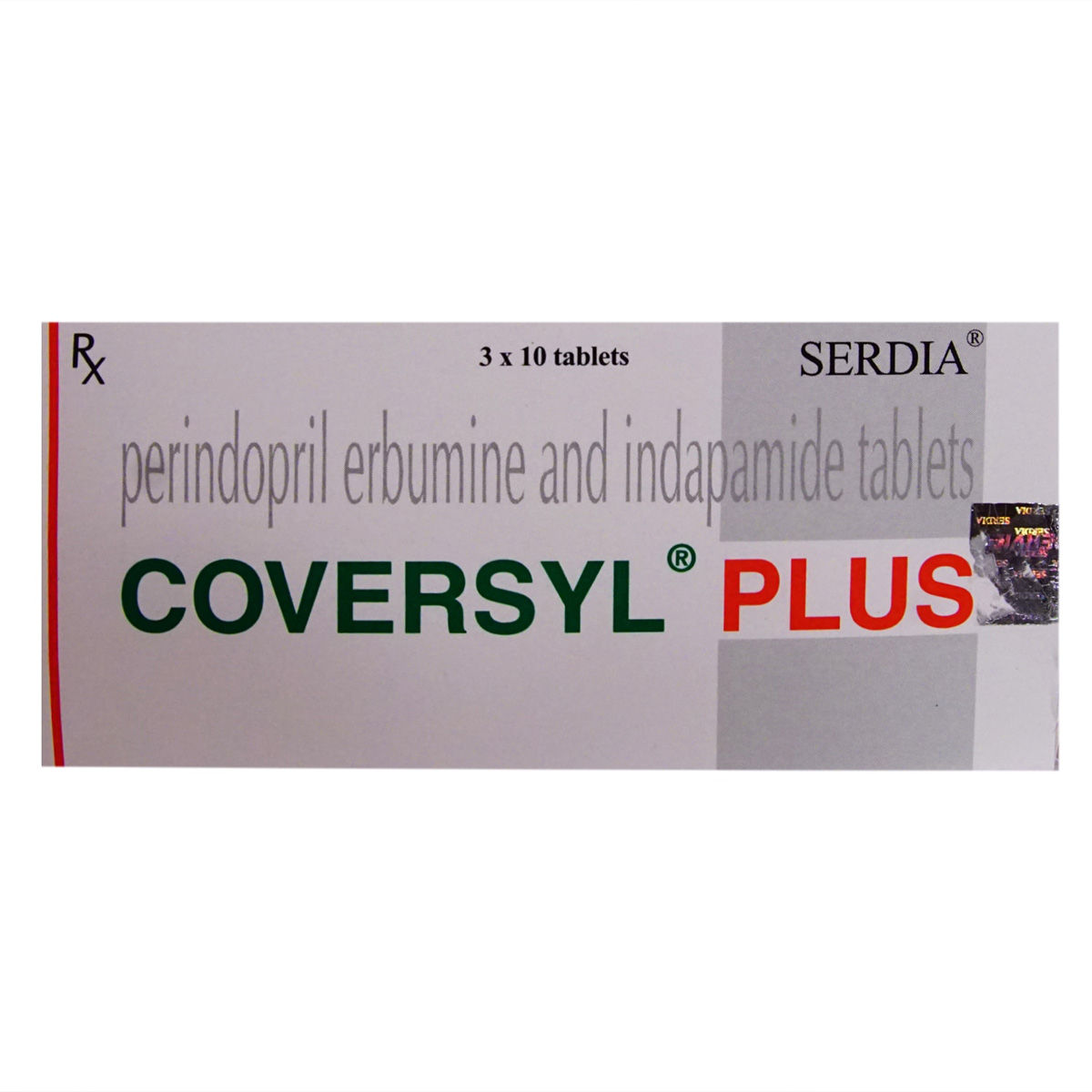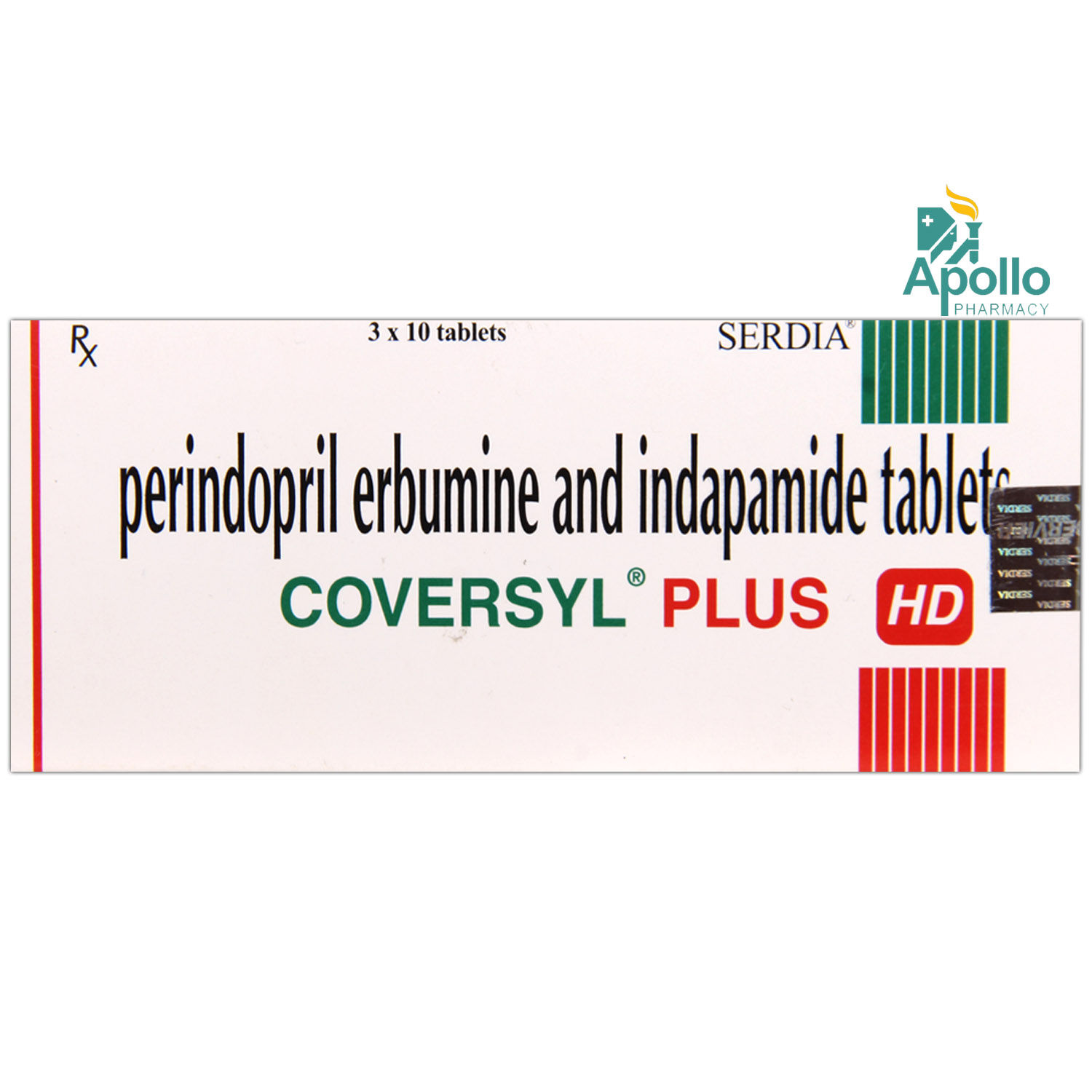Perindopril+indapamide
About Perindopril+indapamide
Perindopril+indapamide is prescribed alone or with other drugs to lower the raised blood pressure. Hypertension (High blood pressure) is a condition in which the force exerted by the blood against the artery walls becomes so high that it causes health problems, such as heart disease.
Perindopril+indapamide contains two medicines: Perindopril (blood pressure-lowering agent) and Indapamide (diuretics or water pills). Perindopril is an angiotensin-converting enzyme or ACE inhibitor that lowers increased blood pressure by blocking a naturally occurring substance known as angiotensin II (that tightens your blood vessels). It allows these constricted blood vessels to relax and helps lower high blood pressure. On the other hand, Indapamide (diuretic) increases the amount of urine passed out from the kidneys. But unlike other water pills, it does not increase urine output. It effectively reduces excess fluid overload in the body and treats oedema (swelling) associated with heart, liver, kidney, or lung disease. This reduces the heart's workload and makes the heart more efficient at pumping blood throughout the body. Thus, both help lower high blood pressure, reducing heart attack or stroke chances.
Perindopril+indapamide is taken with or without food in a dose and duration as advised by the doctor. The doctor will adjust your dose according to your condition and response to the medicine. Sometimes, you may experience headaches, tiredness, slow heart rate, and nausea. Most of these side effects of Perindopril+indapamide do not require medical attention and gradually resolve over time. However, if the side effects are persistent, reach out to your doctor.
Try not to stop taking this medicine of your own. Even if your blood pressure becomes normal, you should not stop using Perindopril+indapamide. Doing so may worsen your condition. Tell your doctor if you have had or currently have liver, kidney, or heart problems. In pregnancy and lactation, Perindopril+indapamide should only be taken after consulting your doctor. You should regularly monitor your blood pressure and heart rate. Please tell your doctor if you are taking any other medicines or are allergic to Perindopril+indapamide. Reducing the amount of table salt (sodium chloride) in your food often relieves the body's swelling.
Uses of Perindopril+indapamide
Medicinal Benefits
Perindopril+indapamide is primarily used to treat hypertension (high blood pressure), reduce the heart's workload, and reduce the risk of any future heart attack or stroke. It contains two medicines: Perindopril (blood pressure-lowering agent) and Indapamide (diuretics or water pills). Perindopril lowers the increased blood pressure by blocking a naturally occurring substance known as angiotensin II (that tightens your blood vessels). It allows these constricted blood vessels to relax and helps lower high blood pressure. On the other hand, Indapamide (diuretic) increases the amount of urine passed out from the kidneys. But unlike other water pills, it does not increase urine output too much. Thus, both help lower high blood pressure, reducing heart attack or stroke chances.
Directions for Use
Storage
Side Effects of Perindopril+indapamide
Headaches
Feeling tired
Slow heart rate
Nausea
Drug Warnings
Perindopril+indapamide should not be given to people allergic to Perindopril+indapamide, have low blood pressure (less than 90 mm of Hg), have had a heart attack, kidney disease, liver disease, pregnant women or planning to get pregnant and breastfeeding women. Perindopril+indapamide is not recommended in neonates and children with worse kidney functioning (glomerular filtration rate <30 mL/min). The raised bilirubin level has been reported in some cases, so patients with liver diseases (like cirrhosis, jaundice, yellowing of skin/eye, etc.) should take the Perindopril+indapamide with caution. Perindopril+indapamide contains perindopril, which is a category D pregnancy drug, it can cause harm to the baby, so it is not recommended to be taken during pregnancy. Do not take Perindopril+indapamide with alcohol as it may cause low blood pressure (hypotension) with symptoms of dizziness, drowsiness, weariness, or sleepiness. Tell your doctor you are using Perindopril+indapamide before undergoing dental or other surgery. Your doctor might stop this medicine before the surgery. Perindopril+indapamide contains Indapamide, which positively reacts to drug tests, so if you are an athlete, be aware if you are taking Perindopril+indapamide and are undergoing a drug test.
Drug Interactions
Drug-Drug Interactions: Perindopril+indapamide may interact with medication used for high blood pressure (nitroglycerin, aliskiren, losartan, valsartan, olmesartan, candesartan, captopril, enalapril), diuretics (amiloride, triamterene), NSAIDs (naproxen, ibuprofen), a medication used for mania and depression (lithium), medicines used in cancer therapy (estramustine).
Drug-Food Interactions: Avoid intake of high potassium and sodium intake. Including these in your diet might increase the level of potassium in your blood (hyperkalemia). Besides this, do not use salt substitutes or potassium supplements while taking Perindopril+indapamide.
Drug-Disease Interactions: Perindopril+indapamide should not be given in patients with angioedema (swelling), bone marrow suppression, congestive heart failure, hemodialysis (A medical procedure to remove fluid and waste products from the blood and to correct electrolyte imbalances), hyperkalemia (high potassium level), low blood pressure (hypotension), liver disease, and kidney dysfunction.
Drug-Drug Interactions Checker List:
Safety Advice

Alcohol
unsafeLimit or cut down alcohol consumption; alcohol consumption may enhance this drug's hypotensive (low blood pressure) effect

Pregnancy
cautionThe use of Perindopril+indapamide or any ACE inhibitors (pregnancy category D) is usually contraindicated during the second and third trimesters of pregnancy. It may cause harm to the developing fetus. Hence, you should always consult your doctor before using the Perindopril+indapamide.

Breast Feeding
cautionUse of Perindopril+indapamide is not recommended during the breastfeeding stage.

Driving
cautionDrive with caution, Perindopril+indapamide may cause blurry vision, and dizziness or weariness may occur.

Liver
cautionPerindopril+indapamide to be taken with caution, especially in case of severe liver disease. The dose may have to be adjusted by your doctor. Perindopril+indapamide should be given with precaution in hemodialysis conditions.

Kidney
cautionPerindopril+indapamide to be taken with caution, especially in case of severe kidney disease. The dose may have to be adjusted by your doctor. Perindopril+indapamide should be given with precaution in hemodialysis conditions.

Children
cautionPerindopril+indapamide is not recommended for children. The safety and effectiveness of Perindopril+indapamide have not been established in children due to limited testing of this drug on children by competent authorities worldwide. If necessary, your doctor will decide whether to give Perindopril+indapamide or not.
Habit Forming
Diet & Lifestyle Advise
Create a well-balanced and healthy diet that includes vegetables, fruits, whole grains, legumes, omega-3-rich foods, and lean protein sources.
Keep your weight under control with a BMI of 19.5-24.9.
Avoid chronic stress, as it can raise your blood pressure.
Spend time with your loved ones to cope with stress and practice mindfulness techniques.
Be mindful of salt; consume no more than 2,300 mg each day.
Limit or avoid alcohol consumption.
Quitting smoking is the best strategy to lower the risk of heart disease.
Special Advise
Monitor your blood pressure daily and if there is too much fluctuation, then immediately contact your doctor.
Patients Concern
Disease/Condition Glossary
Hypertension: The blood exerts increased pressure on the walls of blood vessels leading to hypertension. High blood pressure is expressed as systolic/diastolic pressure. Systolic pressure is the pressure in the arteries when the heart beats or pumps out blood. Diastolic pressure is the pressure in the arteries between the heartbeats. Blood pressure is measured in millimetres of mercury (mmHg) by a blood pressure monitor called a sphygmomanometer. Some of the symptoms are headache, dizziness, nosebleeds, altered vision, chest pain, weakness, and shortness of breath. However, most of the time, the signs and symptoms of hypertension are none.
FAQs
Perindopril+indapamide is used to treat hypertension (high blood pressure), a condition in which the blood exerts increased pressure on the walls of blood vessels.
Perindopril+indapamide contains two medicines: Perindopril (blood pressure-lowering agent) and Indapamide (diuretics or water pills). Perindopril is an angiotensin-converting enzyme or ACE inhibitor that lower increased blood pressure by blocking a naturally occurring substance known as angiotensin II (that tightens your blood vessels). Indapamide (diuretic) increases the amount of urine passed out from the kidneys. Thus, both help lower high blood pressure, reducing heart attack or stroke chances.
It is advised to continue your medicine even after your blood pressure is under control or becomes normal, as blood pressure can shoot up at any time. If you have any discomfort, please consult your doctor immediately.
Usually, Perindopril+indapamide is prescribed for a long-term treatment ranging from months to years for treating heart-related conditions and disorders. However, taking it on your own for years without a doctor's consent can be fatal. Hence, only take it as long as your doctor prescribes it.
Before surgery, you should inform your doctor that you are taking Perindopril+indapamide to reduce your blood pressure when used along with anaesthesia, which is given before a major operation.
Perindopril+indapamide contains Indapamide, which gives a positive reaction to drug tests. If you are an athlete, be aware if you are taking Perindopril+indapamide and are undergoing a drug test.



